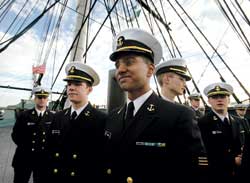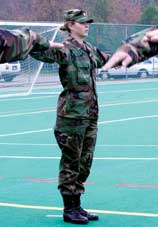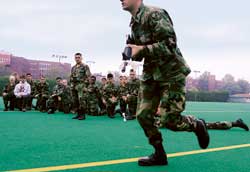The cadets
For some students with a yen to serve and to lead, ROTC offers the challenge they're looking for.
by Laura Ferguson
photographs by Melody Ko
Caroline Kennedy, A06, may be only half right when she describes herself as a "typical Tufts kid." Sure, she majored in history, spent a semester in Spain, co-chaired the Programming Board, and volunteered to teach science in local elementary schools. But there was another side to her life at Tufts, one that required her, every Tuesday, to show up to class wearing military fatigues.
Kennedy has just graduated from the Army Reserve Officer Training Corps (ROTC). In the course of her training, she rose to battalion commander and won the George C. Marshall Award, given to top cadets across the nation. This fall she will see active duty as a commissioned officer in the United States Army.
Keeping a legacy alive
Former NASA astronaut Rick Hauck, A62, A87P, J92P, rarely passes up an opportunity to recommend ROTC. |
Still, to Kennedy, ROTC was a seamless part of her Tufts education. "I never felt that unique," she says. "I look at ROTC as an invaluable learning experience. It has given me the ability to be responsible for othe
r people. I look a lot more closely at how to be a beneficial member of society."
Today 30 Tufts undergraduates are going through a similar learning experience in the Army, Navy, or Air Force ROTC. They juggle the demands of two sets of coursework—ROTC and Tufts. They engage in strenuous physical training and attend weekend camps that test their mental toughness, physical stamina, and ability to follow orders and work together. They rise before dawn to make early-morning classes at MIT (where Tufts ROTC has been conducted since 1977). And they give up part of their summers for additional military training.
Although many ROTC cadets receive partial scholarships—a definite perk in an age of sky-high tuition—they must weigh that benefit against the obligation to serve in the military for four or more years (depending on the branch of the service) after they graduate, and against the risk that they will be called upon to make the supreme sacrifice for their country.
In many cases, scholarship support is too slim to have a large influence on their decision to join up—and, in fact, many cadets are quick to tell you they have no firm plans to become career officers. Rather, they say, ROTC reflects important values: service, patriotism, leadership as an obligation. For Tufts' cadets and midshipmen (as naval cadets are called), ROTC is a choice that seems to combine the desire to serve with the desire to achieve their highest personal goals. They are looking for what Kennedy calls "something bigger than yourself."
It's a quest that comes naturally to students like Frances Dixon, A06, now graduating from the Air Force ROTC. She would have had an extraordinarily busy Tufts career even without military service. She's a double major in international relations and community health, a resident assistant in Stratton Hall, treasurer of the Catholic Center, and head of Oxfam Café. ("Sleep is a kind of secondary priority for me," she says with a laugh.) Her ROTC experience has focused on leadership as well; she rose to vice wing commander and was named inspector general when the position was left open. She oversees the entire wing of 34 students.
Learning valuable leadership and management skills on all fronts (a course at the Sloan School of Management at MIT was a big plus) has helped her hone innate strengths: being fair, being consistent about honest feedback, being a good motivator—she's had to do it all.
"An officer is a leader, and we've learned some valuable people skills," Dixon says. "I think we really strengthen the Tufts community. If you come here, you're already a certain type of student—you're good at what you do and you're a person who will get things done. If some of these students choose to enroll in ROTC, you will produce officers with similar qualities. I'd like to see more officers coming from a liberal-arts education background such as Tufts—it would make the military stronger."
Paul Maliakel, E06, wants to be a doctor; he enrolled in Naval ROTC (NROTC) in response to September 11 when he "felt compelled to do something." The Navy Medical Corps looked like it was the best way to achieve his long-standing goal of becoming a doctor, and to serve in the military as an officer. "I'd be able to achieve both goals through one path," he says.
Selection, of course, is highly competitive. The Navy allows only a certain number of NROTC midshipmen to go through the medical path. This year, 17 NROTC students were selected from across the country to apply to medical school—Maliakel was one of them.
When asked if being a member of ROTC ever made him uncomfortable on campus, he says, in fact, it was quite the opposite. "Everybody I meet and interact with on a daily basis is very respectful and supportive of the choice I have made to serve my country upon graduation. I think this warm reception by the Tufts community can definitely be attributed to the high caliber of students and faculty that are attracted to the university. Most of the people I have met at Tufts are very open-minded and willing to listen to and accept the viewpoints of others, even when they are in stark contrast with their own. The diversity of thought is one of the things that attracted me to Tufts when I was applying to colleges, and it is also one of the reasons why I have had such a great time during my four years here."
 |
 |
Officers and leaders
The place the Army ROTC's Paul Revere Battalion calls headquarters is a low, nondescript brick building a few blocks from the heart of MIT's main campus. Classes begin here when most undergraduates are still sleeping—7 a.m. The academic program takes undergraduates (dressed in requisite fatigues) through all aspects of military science and leadership, as well as rigorous PT, or physical training. Besides Tufts and MIT, the students hail from Harvard, Wellesley, Salem State, Endicott, and Gordon colleges.
At the head of the battalion is Commanding Officer Lieutenant Colonel Leo R. McGonagle. A graduate of Boston University who earned a master's in leader development and counseling, courtesy of the Army, he says he sees an increasing number of bright, talented students attracted to ROTC training and values.
"Our students are developing natural management and leadership skills," says McGonagle. "These are students who are intellectually gifted. They seek the foundation of a successful career—flexible, adaptive leaders who can think on their feet, with the ability to solve problems, lead by example, and speak to, deal with, and interrelate with other people on their level—that is the foundation that we can give them. Once you add tactical and technical competency that is gained through experience on top of that—you have exceptionally trained officers serving in the military."
ROTC may seem like a tough sell in the liberal environs of Cambridge and Boston, particularly in the midst of an unpopular war. Yet the Tufts contingent continues to sign up, to excel, and to grow. In the past year, freshman enrollment in ROTC doubled from 10 to 20—of those, seven were Tufts undergraduates. Seventeen out of the total 55 students in the battalion this year attended Tufts—at their head is Battalion Commander Kennedy. Of 61 midshipmen in the NROTC Old Ironsides Battalion at MIT in 2005–2006, fifteen were Tufts undergraduates: four seniors, five juniors, and six freshmen.
Air Force Detachment 365 reports smaller numbers: three seniors are graduating this year. But two of those seniors, like Kennedy, have risen to top leadership positions. William Lange, A06, is wing commander, and Dixon vice wing commander. They were selected after a board review to lead the 40 other cadets in the detachment. Junior cadet Sean McCooey, A07, this year was one of 20 students nationwide to win an award from the Society of American Military Engineers.
What's behind the ROTC-Tufts connection? Lieutenant Colonel Timothy Slauenwhite, who commands Air Force Detachment 365 at MIT, says it's simple: Tufts students and ROTC are a natural fit. "Tufts students do excel here," he says. "We're looking for students with a solid liberal-arts or engineering background, an interest in foreign area studies, and strong technical skills. Tufts provides excellent opportunities in all those focus areas. In exchange we offer leadership training and management training. All our leadership is cadet-run—they learn by doing. For a lot of talented and directed undergraduates, that's a very compelling experience."
Tufts' showing may also be the result of gentle lobbying on the part of the military. Captain Bob Holland, commander of the Old Ironsides Battalion, says he steers prospective ROTC students—the "top caliber" ones—toward Tufts whenever he can.
"Tufts has things kids are looking for and that we allow—taking a semester off for study abroad and participating in varsity athletics," he says. "Tufts, Harvard, and MIT together have the highest SAT averages in the nation for NROTC. While it is a fairly costly education for the Navy, given the number of scholarships we support, it's money well spent. The benefit to the nation is that we get a very intellectual, thoughtful, and questioning attitude."
But another draw for Tufts students is the preparation ROTC offers for life beyond the military. "We want them to learn to lead, because they could be thrust into a situation, and it might be a second lieutenant in charge of a platoon or serving as the mayor of a city," says McGonagle. "I think they understand that this is what they're here for."
It's a perspective shared by President Lawrence S. Bacow. "Our students have consistently demonstrated their yearning to be active in the world," he says. "We believe that the nation's military is better off having officers who studied at a place like Tufts. We need leaders that had the benefit of a liberal-arts education and who have learned, from their own experience, the importance of diversity and leadership. In this way, Tufts can be a source of enlightened and thoughtful officers."
 |
 |
Goals fulfilled
Nicholas Schroback, A07, for instance, is a junior majoring in history and the president of Alpha Epsilon Pi fraternity. He participates in Marine Corps ROTC, a part of NROTC. "The Marine Corps has so much pride in its history, and so much striving for excellence," he says. "I wanted to be a part of that. I've always had this idea that service to one's country is absolutely necessary."
Maliakel says he has "definitely evolved into a much more responsible and disciplined individual. "I have developed the ability to effectively prioritize tasks, multitask, and meet established deadlines," he says. "The biggest challenge has been learning how to manage both schoolwork and ROTC activities. For most people, the academic transition from high school to college is difficult enough. I not only had to make this transition, but also maintain active participation in my NROTC commitments. At times this was very difficult. However, as time passed, I soon became used to college life. Since freshman year, I have learned to manage my time well enough to be able to take on additional activities, including being a resident assistant and a grader for the math department. Looking back, I have no regrets. I would do everything all over again if I were given the chance."
Battalion Commander Kennedy sees her military experience as a springboard to a career as a leader in government, industry, or business. Her father, who recently retired from the Army's legal arm, the Judge Advocate General's Corps, "thought I had leadership potential, and that I would do a great job in the military," she says. The Army agrees. At the Leadership Development Advanced Camp, a six-week summer camp that evaluates cadets on leadership and other attributes, Kennedy graduated first among 300 college students.
Already, Kennedy has learned lessons that will stand her in equally good stead in the boardroom and on the battlefield. At first she thought military leadership would be a matter of ordering people around. "But I've learned that you have the freedom in the military to do the same thing I do on the Tufts Programming Board," she says. "It is about getting people to really work together."
 |
 |
| |
Confidence counts
Making a choice that sets one apart from the crowd, and that entails great risk, requires a certain confidence. Schroback's family shed tears when he broke the news that he had joined Marine Corps ROTC. "It was kind of a shock to everyone," though in the end, he says, "they did come around to support what I'm doing right now."
Weathering four years of being different takes confidence,
too. "My friends might not agree with my choice," says
Kennedy, "but
they understand it's something that is important to
me, and they respect that."
The real test of confidence is what comes after ROTC. Kennedy knew when she signed up there was a good chance she would be sent to Iraq and, once there, would see combat. "You have to realize why you want to be there, and why you are there," she says. "Not to feel anxious would be unnatural. We are responsible for the well-being of these people and to make sure they return safely to their homes. A lot of that success is understanding that you are the leader but you're not in it alone. I think I have the confidence, based on the experiences here on the Hill and at ROTC, to do that." 
|

